
Death in the Morning and Afternoon
02 May, 2012Paul Preston’s The Spanish Holocaust – Inquisition and Extermination in Twentieth-Century Spain is an eloquent and harrowing testimony of a self-assumed right to rule versus a democratic right to govern: the substance of the Spanish Civil War 1936-1939. In the Spanish tragedy – because that is what it was – 25% came to rule 75% of Spaniards for three and half decades.
The reassuring thing about most dictatorships is that they seldom last longer than the figures that were instrumental in bringing them into being. However, in the intervening period – as was the case in Spain – its duration, coercion and terror were bewilderingly long-lived.
The strength of Preston’s research is that he skewers the Rebels (Nationalists) on their own testimonies, rhetoric and actions in the imposition of the “White Terror”. He is no less impressive in his analysis of the “Red Terror”. But there is a difference – a difference which may not have meant too much to the victims of either side – but there it is – in all its qualitative and quantitative detail.
If the “Red Terror” – propagated by the Republicans (notably the CNT, UGT and the POUM) – was largely reactive, the “White Terror” (Army of Africa/Foreign Legion, Falange, CEDA and the Carlists) was a concerted attempt to liquidate all opposition. It was a cold-blooded strategy thought out in advance which would be implemented without pity or reason. If there were any doubt in the matter then the testimonies of those concerned would reflect it – they don’t. Instead, the principal protagonists, as Preston’s sources show, outlined their objectives to anyone who would listen.
Whilst the Republicans attempted to curb the worst excesses of the Communists and Anarchists, especially the murderous anti-clericalism and the instant justice it provoked, the Rebels were totally indiscriminate; even voting for the Republic was a death sentence. Indeed, whilst the Republicans eventually stamped out the excesses on their side and saved many Rightists in the process, the same cannot be said for the Rebels. Even after the Civil War – and with supporting testimony from Rightists who’d been saved by these self-same Republicans – the wheels of a triumphalist fascist state seldom erred from the path of injustice. Proof positive, if any were needed, that you can’t invoke a concept of justice if the scales are being wound around the necks of innocents in a makeshift garrotte vil.
It is a chastening thought that these people are still with us – and not just in Spain. There are echoes of this in the murderous self-serving prospectus of Anders Breivik – a man who would have fitted easily into the ranks of the Rebels alongside Generals Yagüe, Quiepo de Llano, Mola, Davila, Sanjurjo and Franco. At no time was “reason or right”, in the words of the philosopher Miguel de Unamuno, allowed to interfere with their grotesque take on manifest destiny which found that being a school teacher or being a maid in a Republican household was a crime deserving of death. You can’t argue with this stuff – it is so abhorrent, deluded and irrational – it defies reason. Only the most accepting, distorted and inane sophistry could take in the justification for the Francoists’ policies.
Modern Spain still has a problem with its history as the abortive trial of Baltasar Garzón, the prominent judge, shows. Few of the beneficiaries of Franco’s Spain on the Right of Spanish politics, notably the Partido Popular or those in the Falange, wanted him rummaging in the charnel house and reminding them that their political antecedents butchered nearly 200,000 of their fellow citizens out of a rich blend of hokum – which involved the Protocols of the Elders of Zion, Jews, freemasons, Muslim utopias, godlessness, Socialism, Marxism, feminism and last but not least – the heinous idea of parliamentary democracy. It says something of the excess of the Rebels that even Heinrich Himmler was moved to say to Franco the diplomatic equivalent of “steady on”.
What the Francoists wanted was, in the words of the coup’s architect, General Mola, “people who think like us”. If you didn’t think like them, the country of your birth not only didn’t want you it was going to maim, torture, disinherit, steal, rape, poison and slaughter you into its way of thinking or out of existence. At this point it is worth reminding ourselves that 75% of Spaniards wanted the Republic in 1936, they didn’t what to be ruled by an un-elected clique that represented a small minority of the military, the aristocracy, feudal landords (latifundists), industrialists, businessmen, toadying clerics and monarchists. The election of the Republic in 1936 was supposed to usher in a new era of democracy.
This book is long overdue and all credit to Paul Preston for his painstaking research. No history deserving of the name should be left with the retarded notion that Franco saved Spain for God and the Fatherland and from Communism – he didn’t. He stole it from its own people and government in an orgy of blood-letting. Human agency – his – led to the death of 200,000 largely innocent Spaniards. God doesn’t do bloodbaths and his only begotten son, Jesus, came up with the “Sermon on the Mount” not the sermon on the cemetery mound. Whilst the death of many clerics was an abomination, too, it was less of an abomination than supporting a godless political system – which pretended to be anything but – and which was happy to brutalise and marginalise its own people to support the privileged few in the manner to which they had long been accustomed. There is a telling quote in the book where General Yagüe spells out the menu del dia:
“… and for those of you who resist, you know what will happen, prison or the firing squad – either will do. We have decided to redeem you and we will redeem you whether you want to be redeemed or not. Do we need you for anything? No, there will never again be any elections, so why would we need your vote? The first thing to do is to redeem the enemy. We are going to impose our civilisation on them and if they don’t accept it willingly [sic], we will impose it by force, defeating them as we defeated the Moors when they didn’t want our roads, our doctors, and our vaccinations, in a word – our – civilisation.”
In a prescient moment during Dia de la Raza/Columbus Day, October 12, 1936 – General Millán Astray, a former commander of the Spanish Foreign Legion, interrupted the philosopher, Miguel de Unamuno, the rector of the University of Salamanca, to invite us into the world of the Falangists: “Down with intelligence! Long live death!” He said. Well, as far as the Spanish Civil War was concerned, he wasn’t wrong, was he?
 Franco’s victory in 1939 didn’t stop history, it delayed it. However, it is reassuring to know that Spain is assiduously removing all triumphant reifications of Franco (all but one statue – in Valladolid – remains) but what is more than slightly depressing is that there is such little appetite in a sizeable section of the population to know what really happened. What is it that Santayana said about not learning the lessons of history?
Franco’s victory in 1939 didn’t stop history, it delayed it. However, it is reassuring to know that Spain is assiduously removing all triumphant reifications of Franco (all but one statue – in Valladolid – remains) but what is more than slightly depressing is that there is such little appetite in a sizeable section of the population to know what really happened. What is it that Santayana said about not learning the lessons of history?
This is a comprehensive account which adds substantially to our knowledge and understanding of the pernicous nature of doublespeak in the service of politically motivated murder.
The Spanish Holocaust – Inquisition and Extermination in Twentieth-Century Spain is published by Harper Press (priced £30.00) and can be bought from Amazon and other retailers.
Follow Sounds and Colours: Facebook / Twitter / Instagram / Mixcloud / Soundcloud / Bandcamp
Subscribe to the Sounds and Colours Newsletter for regular updates, news and competitions bringing the best of Latin American culture direct to your Inbox.

